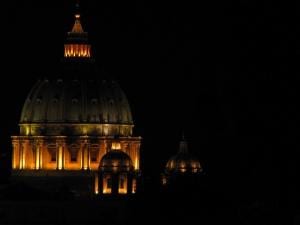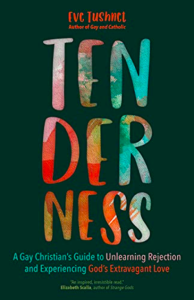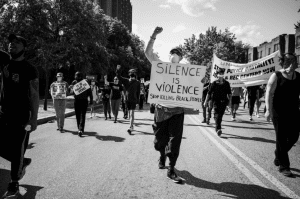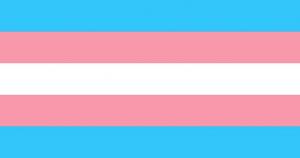A Bit of Background
More often than not I like Commonweal; I’ve even seen one or two of my friends publish there. However, this afternoon, I read a piece that was so poorly reasoned I couldn’t let it go. Professor John Thiel of Fairfield University contributed “The New Donatism” to Commonweal, addressing the ongoing controversy about whether President Biden should be permitted to receive the Eucharist. The question is academic: Cardinal Gregory, the current Archbishop of Washington, has already stated that he doesn’t plan to refuse communion to the President. Short of intervention from the Pope, which doesn’t seem likely, that is pretty much the end of the discussion. But Professor Thiel is tackling the academic aspect, so let’s tackle him.

Before we begin, a note on Donatism. This was a rigorist heresy in Roman Africa (roughly equivalent to Tunisia and north-eastern Algeria today), with roots as far back as the third century. During persecutions, some priests and bishops had surrendered sacred vessels and books to the authorities; this was not considered apostasy in the East or in Rome, but in Africa, it generally was. The Donatists argued that clergy who were guilty of this offense lost the grace of Holy Orders—i.e., not merely that they were disqualified from leadership, but that they actually ceased to be priests at all. The mainstream Church judged otherwise, allowing them to continue in ministry after a long period of penance. (The Wikipedia article on Donatism actually lays the whole issue out pretty well.) The schism between Donatists and Catholics persisted until both were swept away in the seventh century by the advance of Islam.
So what does this have to do with President Biden or the USCCB?
Catholic Pride
I was only nine years old when John F. Kennedy was elected as the first Catholic president in 1960, but I can recall vividly the deep pride that Catholics, still tied to the sensibilities of an immigrant Church, felt at his election to high office. Now, a rather large swath of the American bishops feel no such pride at the election of our second Catholic president.
This prompts some grave questions, prominent among them “So what?” and “Who cares?”
The joke is a little harsh, of course. Anti-Catholicism was a lot more blatant and damaging in the 60s—partly (though not only) because it was tied into a more explicit racist animus. There is no sin in feeling happy and proud that a fellow Catholic holds the single highest office in the country. It’s natural that a minority who were mostly disadvantaged and despised would feel that very strongly.
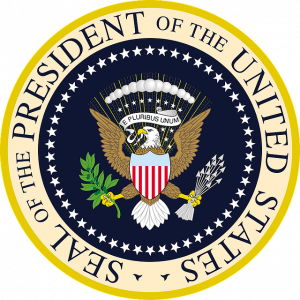
The thing is, you can feel that way and still think the President should refrain from, or even be refused, holy communion. Communion is not a commentary on the patriotic thrill we feel when we see President Biden holding a rosary in the White House. It is the flesh and blood of God. Anyone who approaches the altar should do so with trembling awe before the divine Majesty, no matter what office they do or don’t hold in the secular order. Being a political leader is not, and should not be, a license to bypass the Church’s sacramental discipline; if anything, given the national and even international example they set, the Church should apply the rules more strictly with statesmen, not less.
Making an Example
Instead, they seem intent on making him a negative example to the American Catholic faithful. This initiative is especially striking because President Biden is a practicing Catholic … One might think in a time when Catholics have left the Church in droves—so many in disgust at the astonishing moral failure of bishops to protect children from priestly predators—that the election of a Catholic president who wears his piety on his sleeve would be a moment to celebrate in the American Catholic Church.
A practicing Catholic who wears his piety on his sleeve, to be sure. And Henry VIII made his piety known by crawling to the cross during the Good Friday liturgy in 1539.
To refuse the Eucharist to a believing Catholic, to excommunicate him at least sacramentally …
As opposed to the other kind of excommunication?
That aside, refusing a person the Eucharist is not excommunication, nor is belief the sole qualification to receive. In order to receive, a communicant should not be in a state of mortal sin.1 No amount of piety, however public, and no amount of belief, however orthodox, is a substitute for that.
On Mortal Sin
Now, where do I get off saying President Biden is in a state of mortal sin? Strictly speaking, I cannot say that. I can say he certainly looks like he’s in a state of mortal sin, due to his political beliefs about abortion; but I am in no position to (and don’t want to) comment on how clearly he understands Catholic teaching on that point, and what his degree of responsibility is accordingly. Denying the Church’s teaching about abortion is a grave sin, but gravity is only part of what makes a sin mortal—full knowledge and deliberate consent are also essential, and those are things we can only make intelligent guesses about when it comes to other people.
You could make a case that public figures should be refused the Eucharist for any grave, publicly known sin, without trying to judge whether their sin is mortal or not. I’ll admit I have some sympathy for this; tired though the word is, there is a genuine danger of scandal in admitting people to the altar under those circumstances. Dissenting from the Church’s established doctrine is not a trivial thing.
But there are problems with such a policy, too, including scandal of a different kind. Laxity can set a bad example of self-indulgence and indifference; severity can set a bad example of self-righteous arrogance. The Church has left these decisions in the hands of the local bishop for a reason.
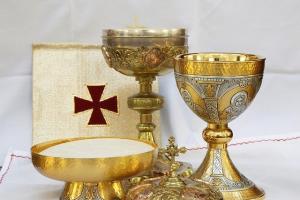
In the judgment of the bishops, Biden’s sin seems to be that, as a Catholic politician, he has not taken a public, political stand against abortion.
Yes, that’s correct.
Politics and Doctrine
Biden has stated many times that he considers abortion to be a moral evil. … But, like many Catholics who believe the same, he finds that his personal belief conflicts … with the law in a democracy that affirms the First Amendment.
I’m pretty sure neither giving birth nor getting an abortion fall under the liberties of speech and press, religion, or assembly that the First Amendment addresses. Nor, to the best of my knowledge, is anybody proposing to repeal the freedom of pro-choicers to express and publish their views. The only part of the Bill of Rights that’s historically been pertinent to the abortion discussion is the Fourteenth Amendment, which (according to Roe v. Wade) covers a woman’s right to get an abortion as part of her right to privacy. This has absolutely nothing to do with the First Amendment.
Moreover, Biden affirms a woman’s right to make her own choices regarding reproduction, even if he personally believes that some of these choices, however tragically contextualized, might be choices for moral evil. As I noted, many American Catholics hold the same position as Biden, as, I should say, do I.
Which is not unreasonable on the face of it, but it relies on a misrepresentation of what the Catholic Church teaches. This is not about the religious dogma that abortion is wrong, but about the scientific determination that life begins at conception and a consequent philosophical belief that it is wrong to extinguish that life, because it is human, and therefore inherently has the same rights and dignity as every other human life. In other words, what the Church is saying is that we are responsible to hold not only the moral but the political belief that abortion is wrong. Rejecting that is dissent from the Church’s teaching, whether the dissenter holds President Biden’s moral views or not.
So Wait … Donatism?
By betraying the faith … had the [lapsed] bishop invalidated his baptism and so proved undeserving of a continuing ministerial role in the Church? [Donatists] believed that the answer to this question was a resounding yes, since the purity of the Church and the graceful efficacy of its sacraments would otherwise be polluted … The Donatist solution was that lapsed bishops needed to be re-baptized and by that sacramental act reintegrated into the Church’s purity …
This is the first time I’ve ever heard that the Donatists advocated rebaptism to restore apostates to the Church. According to everything else I’ve read, the Donatists taught that, while apostates could rejoin the community as lifelong penitents, they could not receive absolution or return to communion, still less resume ministry. They did rebaptize believers who entered the community after a Catholic baptism, but that was because they didn’t recognize Catholic sacraments. But I may just have more reading to do, and obviously this is a little beside the point.
The Church is not a gathering place for the saved but a refuge for sinners … Augustine insisted that the graceful efficacy of the sacraments did not depend on the personal holiness of those who administered them, as the Donatists maintained. The sacraments possessed a supernatural power that brought sinners to salvation even when administered by priestly sinners. … St. Augustine’s understanding of the Church remains Catholic teaching to this day.
This part’s perfectly correct. No complaints here. Moving on.
“The New Donatism”
How does the Donatist controversy shed light on the bishops’ recent disciplinary gambit? The bishops seem to see the Church as the Donatists did. Those of them who argue that President Biden is required to hold a public, political position on abortion that directly reflects his personal belief in order to be worthy of the Eucharist appear to have made the judgment that the Church is characterized by a purity that cannot abide the sinful pollution of Biden’s political behavior.
And then we take another sharp turn into silliness. This is not a commentary on Biden’s personal piety; it’s an application of the Church’s discipline of the sacraments, a discipline which applies (or at least should apply) to everybody. And the source of that discipline is not Donatism, whether explicit or imagined, but the letters of St. Paul, notably in passages like I Corinthians 11 and I Timothy 1. There’s nothing Donatistic about this.
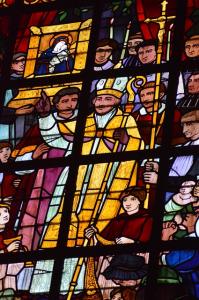
… It is yet Donatism in a new key, its newness defined by the rather odd ways that the bishops have reconfigured the pure/impure binary. The ancient Donatists focused their concerns about moral failure on episcopal leaders … Instead, the bishops are portraying the most prominent American Catholic as impure—not because he does not believe with the Church but because he holds a political position with which they disagree.
No, it literally is because he does not believe with the Church. The Catholic faith sometimes has explicit political consequences tied to it, like the fact that Catholics may not become Freemasons or members of the Communist Party. Abortion is one of those matters. The President, in failing to stand up for the human rights of the unborn, is guilty of the same kind of fault that William Barr and Mike Pompeo are guilty of in defying the Holy See’s teaching about capital punishment.
About the USCCB, Though …
The American bishops have shown no sign of such reflexive critique. There has been no talk on their part, for example, of withholding the Eucharist from bishops who were complicit in the sexual abuse of children.
This is a very good point. They absolutely should be talking about tha—
Nor, as I have argued here, should there have been.
Oh wow. Okay, you’ve lost me, Professor. This is a truly revolting attitude, and I have no idea what moved you to put it on paper. Bishops who’ve been discovered to be complicit in the sexual abuse of children, as you so kindly specify, should be deposed and publicly defrocked for their monstrous callousness toward the most vulnerable lambs of the flock.
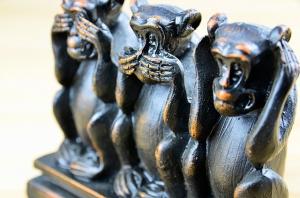
Of course, being stripped of office does not necessarily entail excommunication, either temporary or permanent. Bishops whose repentance and penance are as public as their sin should be readmitted to the altar, though not necessarily entrusted with leadership again—not because their sacraments wouldn’t be valid (which is precisely the Donatist view), but because they’ve clearly shown they’re not to be trusted.
Could this typically Donatist tactic of foisting impurity outside the Church’s holiness be a strange way for the bishops to regain an imagined moral purity publicly lost in the past two decades?
Well, you’re still getting it wrong by insisting on viewing this through a Donatist lens; but that may well be what the USCCB is trying to do. If they’re not above concealing and perpetuating the rape of children, I don’t think they’re above cynical P.R. moves.
Again?
Why have the bishops begun an initiative that would withhold the Eucharist from Biden—and perhaps from a handful of other Catholic politicians? Why not issue a teaching that would withhold the sacrament from the millions of American Catholics who hold the same position on abortion as the president?
Again: they have. Catholics who dissent from the Church’s teaching that we must oppose abortion, not only morally but politically, should normally not present themselves to receive the Eucharist.2 The fact that most bishops choose not to enforce this rule, and that a large proportion of the laity either don’t know about it or choose to ignore it, is neither here nor there.
Doing so, of course, would utterly fragment what’s left of the American Church, spiritually and—the word needs to be pronounced—financially.
Maybe. Personally I think it would be utterly despicable to downplay Catholic teaching in the name of keeping the Church’s wallet more secure. Not that I’m eager for schism; Christian division is a tragedy. But I’m also not eager to face God at the Last Judgment and try to explain to him that applying the deposit of faith consistently wasn’t a good ROI.
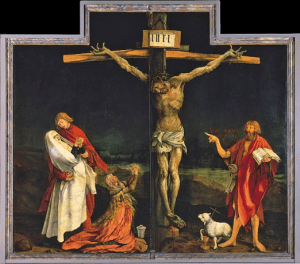
There is no moral heroism, and certainly not the taking of a self-described prophetic stance, in disciplining a faithful Catholic on the basis of a political position held by very many American Catholics.
There is, actually. Or rather, there can be; I’m not so naïve as to think the USCCB’s motives must be good here, as I’ve discussed already. But, for a better example, why not look up the Catholic Church’s history of desegregation, and see how many American Catholics felt about that?
The positions held by “many American Catholics” are of absolutely no consequence. Unpopularity does not matter. The Church is not a democracy and has never pretended to be one. She claims to be the vessel of divine revelation—a claim which may well be false, but is not amenable to the changing moods of any nation’s populace, and certainly not America’s. We are not that special.
1There are a few wrinkles here, but we can’t stop for those now.
2Here too, the situation is slightly more complex than this, which is partly why the bishops have latitude to allow dissenting politicians to receive.


